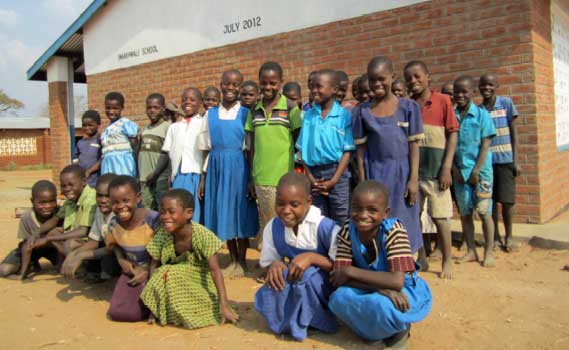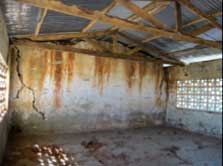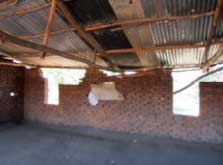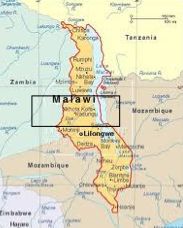Masasa Primary School completed on August 11, 2012!

The New School Block
Masasa Community Profile
MASASA COMMUNITY PROFILE
Masasa village was founded in 1928 and has a population of approximately 4,000 people. The majority of Masasa’s residents belong to the Chewa ethnic group and most practice Christianity. Masasa falls under the jurisdiction of Traditional Authority Wimbe and SubTraditional Authority Chitanthamapiri, and the chief is Senior Group Village Head Masasa.
Masasa is 42 km from the buildOn office in Kasungu. The closest health clinic is in Wimbe, 35 km away; people travel there on foot or by bicycle taxi. Small scale farming is the primary incoming generating activity in Masasa, and the staple crops are groundnuts (peanuts), maize, beans, soy, tobacco and some fruits. The Dwankhwali River flows nearby. The climate in Masasa is typical of Malawi’s savannah, with a warm dry season from August to November and a cooler rainy season from December to April.
Masasa village was founded in 1928 and has a population of approximately 4,000 people. The majority of Masasa’s residents belong to the Chewa ethnic group and most practice Christianity. Masasa falls under the jurisdiction of Traditional Authority Wimbe and SubTraditional Authority Chitanthamapiri, and the chief is Senior Group Village Head Masasa.
Masasa is 42 km from the buildOn office in Kasungu. The closest health clinic is in Wimbe, 35 km away; people travel there on foot or by bicycle taxi. Small scale farming is the primary incoming generating activity in Masasa, and the staple crops are groundnuts (peanuts), maize, beans, soy, tobacco and some fruits. The Dwankhwali River flows nearby. The climate in Masasa is typical of Malawi’s savannah, with a warm dry season from August to November and a cooler rainy season from December to April.
Old School Conditions

One of the Old School Blocks
Dwankhwali Primary School: Prior to this project there were three temporary school blocks in Masasa, but these structures were not large enough to accommodate the hundreds of enrolled students in the community. Masasa was recommended to buildOn by the District Education Manager’s office as part of a list of 20 high priority schools because at least one of the existing blocks there was partially collapsed. Several of the classrooms were in such a state of deterioration that they posed a safety hazard to the students. There are currently 1240 students (up from 870 last school year!) enrolled in Dwankhwali Primary School. They study with 8 teachers in grades 1 through 8. Two of these teachers were added by the Ministry of Education after the completion of the new school block this summer.


The Masasa School Block Project
The Masasa school project broke ground on June 24th 2012 and was completed on August 11th 2012. The people of Masasa contributed a total of 3,157 volunteer workdays to the project, finishing 17 days ahead of schedule. This school block in Masasa has 2 classrooms built with fired clay bricks, corrugated metal roofing and poured concrete. Students began using the new school at the beginning of their new school year, which began on September 3rd.
Before starting construction they also molded thousands of clay bricks, collected local materials for the project and met with our staff to sign a covenant outlining the following responsibilities:
Community Contribution
• Unskilled labor: 30 workers (15 women and 15 men) per day, six days per week
• Commitment to educating girls and boys equally
• The land on which the school is built
• High quality local materials: sand, gravel, water & rocks
• Volunteer management committee made up of 12 villagers (six women, six men)
• Lodging for buildOn Field Coordinator and skilled laborers in local houses
• Basic construction tools (picks, buckets, etc.) when available
buildOn Contribution
• Architecture and engineering
• Construction materials (excluding local materials)
for school and latrine
• Skilled labor and plans needed to build the school
• Project management (buildOn coordinators)
• Instruction in basic construction techniques
Before starting construction they also molded thousands of clay bricks, collected local materials for the project and met with our staff to sign a covenant outlining the following responsibilities:
Community Contribution
• Unskilled labor: 30 workers (15 women and 15 men) per day, six days per week
• Commitment to educating girls and boys equally
• The land on which the school is built
• High quality local materials: sand, gravel, water & rocks
• Volunteer management committee made up of 12 villagers (six women, six men)
• Lodging for buildOn Field Coordinator and skilled laborers in local houses
• Basic construction tools (picks, buckets, etc.) when available
buildOn Contribution
• Architecture and engineering
• Construction materials (excluding local materials)
for school and latrine
• Skilled labor and plans needed to build the school
• Project management (buildOn coordinators)
• Instruction in basic construction techniques
The community learnt that a good methodology and proper site management are keys to development. Without the structure from buildOn and the strong leadership of the Project Leadership Committee, this project would not have been as successful as it was. We are very grateful for the school. During the construction I observed community members working hand in hand. The school has brought unity in the community, especially between parents and their children.
- Nkhunehlu, age 32, parent
